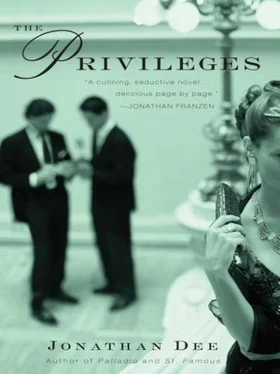“No,” Irene said. “He’s still in the hospital. They can’t move him until they have somewhere to move him to. I’m in our home.”
Our home! She tried to keep her emotions moored in the practical. “What’s the name of the hospital?” she asked.
“They probably won’t let you talk to him, I’m afraid. Not on the phone. He’s just awake too little of the time.”
“Why is he still there, if he doesn’t want to be there anymore?”
Irene cleared her throat. “This is a part,” she said, “a very small part, of why I’m calling. This place, it’s called Silverberg Hospice of South Florida, it’s … it’s an expensive facility.”
“Aha,” Cynthia said. She halted in her pacing and stared out the window past the Triborough, over the level expanse of Queens. When it was clear, you could stand at that window and count a dozen airplanes stratified in the sky. “Well, Irene Ball, you’ve come to the right place. It’s called Silverberg?” The cook came in the door; Cynthia made a furious scribbling motion in the air and then snapped her fingers at her, which surprised the woman visibly. “And it’s in Fort Myers. Well then. You’ve been a great help. Many thanks. Best of luck to you.”
“I’m sorry?”
“I can take over from here,” Cynthia said, leaning her forehead against the glass. “Thank you, Irene. I’m very grateful to you. I mean it.”
More dead air. “I thought,” Irene began. “I mean, maybe I didn’t explain it right. You are coming down to see him, right?”
“Of course. It’s just — well, look, I have no desire to hurt anybody’s feelings here, but since my father has never mentioned you to me, I just didn’t want to take anything for granted. I don’t want you to think that I expect there’s any obligation on your part. I’m happy to take care of whatever needs to be taken care of. That’s all I meant.”
The cook appeared with a pad and pen. Cynthia sat back down at the table and wrote the word “Silverberg,” and closed her eyes.
“Your father and I,” Irene said, sounding quite confused, “are in love with each other.”
These long silences; was this how other people, people who didn’t live in New York maybe, conducted themselves on the phone? It was harder to be polite now that there were all these arrangements to be made, so Cynthia said, “Well, I imagine we’ll see each other soon, then. Goodbye,” and hung up. Irene Ball, she thought. What a name. She was shaking so hard she had to light up a cigarette in the house. At least no one was around to scold her for it. She called Lee Memorial in Fort Myers and asked to speak to the head of the cardiac-care unit there, and while she was waiting for a call back she spoke to the director of the Silverberg Hospice, who told her that she was very sorry but there were no beds currently available. She ended the call politely but without ever quite accepting that answer, and then she ran into the living room, grabbed her laptop, found Silverberg’s annual report online, and scrolled all the way to the end of it. It was run, as she’d guessed, as a charity, and though it was a local one, the board included a couple of names she knew. She called one of them — even though it was still early, even though it was Saturday — and said as plainly as she could that she needed a favor. There was always, when it came to getting things done, a level above your level. There was always that next level to acknowledge, and to aspire to.
By the end of the afternoon her father had been transferred to the hospice by ambulance. Since Adam and April had taken the jet, she left Dawn a voice mail asking her to book a charter to Florida Monday night; there was a foundation board meeting first thing Monday at which she had to present, and anyway, she figured, why not give him a chance to settle in a little bit, get comfortable, maybe give Irene and her long silences a chance to say a private goodbye.
He was an exceptionally proud man. He’d never asked her for anything and he wasn’t about to start now that he was at his weakest. She was proud of him for that and frustrated at the same time. Why would he risk having some need of his go unmet rather than ask her to meet it? Surely there was no question in his mind that she might say no. Maybe he felt guilty. Or maybe he thought it was more considerate to spare her the facts of his weakness.
She put off trying to reach Adam because she was worried that he would want to turn right around and fly home. Too grueling, and also pointless, since the cardiac-care doc she’d spoken to estimated that her father still had several weeks to go. Jonas was in Chicago and there didn’t seem much point in pulling him away from his studies to sit at the deathbed of a man he hardly knew.
The next night was the cocktail reception, for a children’s charity the foundation had just gotten involved with called Little Red Wagon. A small affair for a few influential donors, maybe twenty people altogether. She spent a lot of time apologizing for Adam’s absence. It was depressing, working the room alone, even though this wasn’t the first time she’d done it, even though the room in question was in her own home. She felt liberated and sad at the same time. Always the same faces at these events.
Toward the end of the evening, one of the cooks came all the way into the doorway of the solarium and discreetly caught Cynthia’s eye. There was a phone call for her, which had for some reason been transferred to the kitchen; she took it in there, while all the servers turned their backs and acted soundlessly busy. Remarkably, it was Irene calling again; but before Cynthia could politely defer her, she interrupted to say that her father’s health, now that he was comfortably installed in the hospice, had taken a precipitous turn, such that rather than wait until later in the week as planned, Cynthia had better fly down there as soon as she possibly could.
There was no way, not even after Jonas shamelessly dragged his parents’ name into it, that Margo the gallery owner was going to give up any contact information for Joseph Novak. She kept telling Jonas that she had been in the business for thirty years, as if that explained anything. But then Jonas had a brainstorm: he recalled Margo’s mention, at the art fair, of the brother in Kenosha. There were a lot of Novaks in Kenosha, as it turned out, but he finally dialed the one he was looking for, and after that it was a simple negotiation. Arthur Novak didn’t care who the money came from. You could tell from the merriness in his voice that he just couldn’t have been more tickled to have stumbled into this world of rich idiots who forever needed new things to waste their money on.
When Jonas asked for his brother’s address, though, Arthur hesitated a moment. “You do know what he was locked up for, right?” he said.
The sudden caution in Arthur’s voice spooked Jonas into fearing that he might change his mind about the whole thing. “Sure,” Jonas said, “I know all about that.”
“Well then,” Arthur said, and he gave Jonas the address. Jonas didn’t mention the jail business to Nikki — she was freaked out enough as it was by his “infatuation” with Agnew and this whole notion of making him a gift, in effect, of an artist so far out on the margins that even Agnew had never heard of him.
“I’m thinking ahead,” Jonas said. “I mean I’m genuinely interested in the subject, and I’m sort of in Agnew’s favor right now for whatever reason and I want to capitalize on that. I can get a jump on a master’s thesis this way.”
“What the hell difference does it make,” she said, “how fast you do it?”
He shrugged. Maybe it was a way of closing the gap between him and her. But in the end the impulse was so strong that it didn’t really matter to him what the reason was. Two days later he rented a car and drove into Wisconsin. Nothing but brown fields and broken stalks surrounded the highway, until some strange concern would rear up out of nowhere — a liquor wholesaler, a John Deere dealership, a Church of Latter-day Saints — and then disappear in his mirror. When it got to be a reasonable hour he started dialing Novak’s phone number, but Arthur Novak had told him not to expect his brother to answer necessarily, and he didn’t. Jonas never let it go past five or six rings for fear of antagonizing him. He held the printed directions against the steering wheel with his thumb as he drove.
Читать дальше












